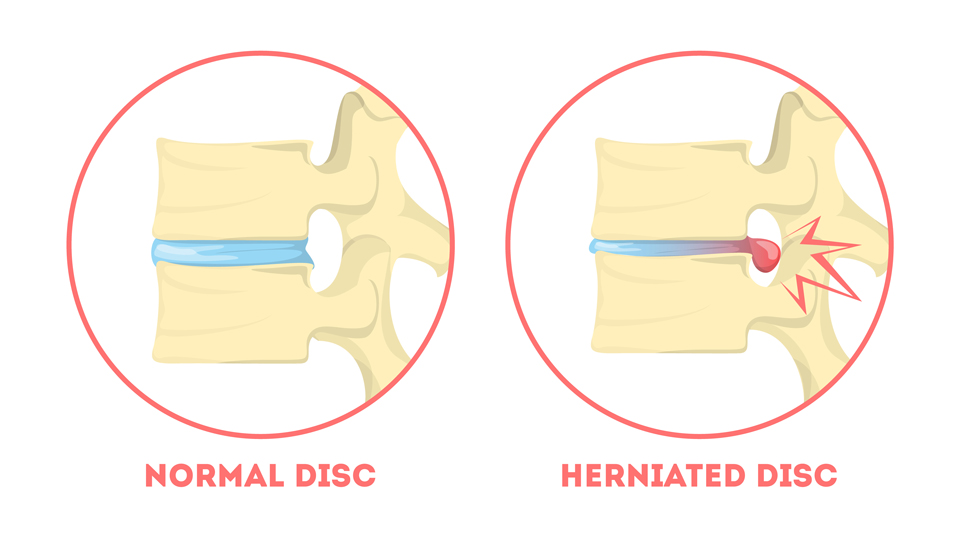Herniated Discs and Chiropractic Care

If you have a herniated disk, you may be interested in exploring chiropractic care.
What is a Herniated Disc?
A herniated disc, also known as a slipped disc, is a common condition that affects the spinal discs. The spinal discs are small, rubbery cushions that serve as shock absorbers between the vertebrae in the spine. They have a tough outer layer called the annulus fibrosus, and a jelly-like center called the nucleus pulposus.
A herniated disc occurs when the nucleus pulposus pushes through a tear or weak spot in the annulus fibrosus, causing the disc to bulge or rupture. This can result in the disc pressing against nearby nerves or the spinal cord, leading to painful symptoms.
While herniated discs can occur anywhere along the spine, they most commonly occur in the cervical (neck) and lumbar (lower back) regions.
The development of a herniated disc can be caused by various factors, including age-related degeneration of the disc, trauma or injury to the spine, and excessive strain or pressure on the disc.
Certain lifestyle habits like poor posture, excessive weight, and repetitive motions can contribute to the development of disc degeneration and herniation.
Between 60% and 80% of people will experience low back pain at some point in their lives. Some of these people will have low back pain and leg pain caused by a herniated disk. [1]
Symptoms of a Herniated Disc?
In the case of a herniated cervical disc (in the neck region), individuals may experience neck pain that radiates to the shoulders and arms. They may also have difficulty moving their neck without experiencing pain or stiffness.
When a herniated disc occurs in the lumbar region (lower back), individuals often experience lower back pain that radiates down the buttocks, thighs, and even to the feet. This pain may be accompanied by numbness, tingling sensations, or even muscle weakness in the legs.
Individuals with a herniated disc may experience an increase in pain when engaging in activities that involve bending, lifting, or twisting. Sitting or standing for long periods may also exacerbate the pain.
A herniated disc can put pressure on the spinal cord or nearby nerves, resulting in additional symptoms. These may include shooting pain down the arms or legs, known as radicular pain. Numbness or tingling sensations may also occur in the affected extremities.

Chiropractic Care for Herniated Discs
Chiropractic treatment focuses on the spine and its alignment, as well as the musculoskeletal system as a whole. Chiropractors use spinal adjustments and manipulations to alleviate pain and improve overall spinal function. When it comes to herniated discs, chiropractic adjustments can be particularly effective in reducing pain and promoting healing.
During a chiropractic session, the chiropractor will carefully assess the patient’s medical history and perform physical exams to determine the severity and location of the herniation. Diagnostic tests, such as X-rays or MRI scans, may also be ordered to get a clearer picture of the disc condition.
Once the diagnosis is confirmed, the chiropractor will develop a personalized treatment plan tailored to the individual’s specific needs. This treatment plan may include a combination of spinal adjustments, targeted exercises, and other therapeutic techniques to alleviate pain and restore proper spinal function.
Chiropractic adjustments work by gently stretching and realigning the spine, taking pressure off the affected disc and surrounding nerves. This helps to reduce inflammation, improve blood flow, and stimulate the body’s natural healing process.
Chiropractic care for herniated discs provides a non-surgical option. By opting for chiropractic therapy, individuals can avoid the risks and complications associated with surgery while still achieving significant pain relief and improved function.
What Factors Should Be Considered Before Beginning Chiropractic Treatment?
While chiropractic adjustments can be effective for many individuals, more severe herniations or those involving the spinal cord may require a different approach, such as surgical intervention.
Individuals with underlying conditions, such as degenerative disc disease, may require a comprehensive treatment plan that goes beyond chiropractic care. Chiropractors can often work in conjunction with other healthcare professionals, such as physical therapists, pain management specialists, or nurse practitioners, to develop a holistic approach that provides optimal results.
Certain medical conditions, such as osteoporosis or spinal cord disorders, may necessitate modifications to the treatment plan or additional precautions. A thorough understanding of a person's medical history allows the chiropractor to tailor the treatment to their specific needs and ensure their safety throughout the process.
If an individual's pain is severe or has persisted for an extended period, a chiropractor may recommend additional diagnostic tests or consult with other healthcare professionals to rule out any serious underlying conditions and determine the most appropriate treatment approach.
Every individual is unique, and their preferences should not be overlooked when considering chiropractic treatment. Some individuals may feel more comfortable with a non-surgical option like chiropractic care, while others may prefer exploring other treatment modalities.

Diagnosis For Herniated Discs with Chiropractic Care
Chiropractors typically begin by conducting a thorough physical examination, which may involve assessing the patient’s medical history, conducting neurological tests, and evaluating the spine’s range of motion. Diagnostic imaging tests, such as X-rays or MRI scans, may be ordered to obtain a more detailed picture of the affected area.
Holistic Treatment Options
Once a herniated disc has been properly diagnosed, chiropractic care offers a range of treatment options to help alleviate pain and promote healing. One of the primary modalities used by chiropractors is spinal manipulation or adjustments.
These specialized techniques involve gentle, targeted manipulation of the spine to realign the vertebrae and reduce pressure on the affected disc. By restoring proper alignment, chiropractic adjustments can alleviate nerve compression, reduce inflammation, and relieve pain associated with herniated discs.
Herniated discs can restrict the range of motion and make everyday activities challenging. Chiropractors can work to restore proper alignment and movement in the spine, allowing for improved flexibility and mobility. By targeting the underlying issues causing a herniated disc, chiropractic adjustments can help a person regain their ability to move freely and engage in activities that were once difficult or painful.
Chiropractors may incorporate other therapies into the treatment plan. These may include:
- Acupuncture
- Ergonomic adjustments
- Lifestyle modifications
- Massage
- Proper posture techniques
- Stretching to increase flexibility and range of motion
- Therapeutic exercises to strengthen the surrounding muscles and improve stability
- TENS unit therapy
Chiropractic care focuses on the overall well-being of the patient. Chiropractors consider how the spine’s alignment affects the entire body and may address other areas of concern in addition to the herniated disc. By improving overall spinal health, chiropractic care aims to enhance the body’s ability to heal itself and prevent future injuries.

Are you suffering from the pain and discomfort of a herniated disk?
Imagine finally getting relief from your herniated disk and being able to live your life without constant discomfort. We offer a natural and holistic approach to healing, without the need for invasive procedures or strong medications. Contact us today to schedule an appointment.
Source:
[1] Herniated Disk in the Lower Back – OrthoInfo – AAOS. (n.d.). https://orthoinfo.aaos.org/en/diseases–conditions/herniated-disk-in-the-lower-back/



